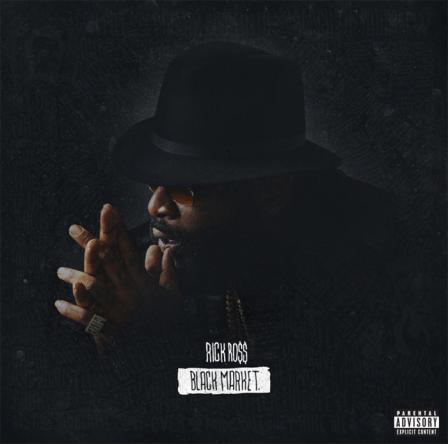Brothers and sisters, I don’t know what this world is coming to. A man’s Planned Parenthood attacks threaten poor and working-class families of color, economic inequality in America is severe and growing, and protests rage in the streets over the police shooting of Laquan McDonald. What a time to be alive, indeed. Even rappers who once sat comfortably atop a throne of big-face hundreds are going through their own hard times, opening escrow accounts in their birth names, scaling down on tired drug kingpin raps, and assuming redemptive street preacher roles to better reflect a marginalized crowd. But don’t think for one second that the Bawse, Rick Ross, is just going to quietly put his M-M-M-Maybach luxury coupe in storage. Hell naw, he’s still out popping Luc Belaire black bottles and dropping a cool stack on a pair of high-top Louboutins. Sure, he’ll occasionally try his hand at bridging the gap between street raps and protest chants, but by no means does he do this with an elevated consciousness. And with Black Market, Ross’s eighth studio album to date, there appears to be a noticeable disconnect between the lavish lifestyle he regularly depicts in his music and the newfangled musings on a rap career that’s nearing a decade.
For years now, major labels have avoided any broached subject concerning rap music, its place in the industry, and a rapper’s career longevity. Because they’re often exploited by labels as expendable, many rappers scrupulously stick to a familiar script. As the adage goes: if it ain’t broke, don’t fix it. But for Rick Ross, whose certainly seen better days, that safety blanket is now being tugged by both label execs and an ever-shifting rap scene, demanding that he finally step it up. Throughout Black Market, Ross levels accusations at the inscrutable music industry he believes has wronged him: “Charging for the verses, I’ll throw in the chorus/ Slip-N-Slide fucked me, friendship was aborted.” Furthermore, his experiences as a ghostwriter, dealing with shady business practices, and phony friendships swirl in an overflowing pot of flavorless gumbo. While these insider glimpses may read exciting on paper, they’re not the least bit thrilling when put to music. Ultimately, all the endless chatter on Black Market about penning songs for other rappers and subliminal potshots at big-name artists proves itself uneventful, culminating in a final product too preoccupied with #RapTwitter and generating YouTube flame wars to capture the imagination of the listener.
Elsewhere on Black Market, Rick Ross’s lumbering presence is dead on arrival. Here was the man whose imposing, larger-than-life persona and unmistakably booming voice once commanded even the most second-rate songs. However, he’s sorely lost the juice somewhere betwixt last year’s underperforming but nevertheless exciting throwaway Hood Billionaire and September’s drab Black Dollar teaser tape. Despite an impressive physical transformation — to a fruitful diet of pears, apparently — and appearing noticeably more level-headed than usual, Ross is far from an agile songwriter on Black Market. His flow is largely unbroken throughout the album’s bloated hour-long runtime, sounding like he’s either sleepwalking through a song or reading scribbles off of an old napkin. He’s perhaps at his worst when feigning clout as a hooksmith: “Dope boy, dope car, I got the dope dick/ Dope dick, the bitches love me for the dope dick,” goes the awkward penis ditty, “Dope Dick.” The strengths of Ross’s character lie in admonitory tales of life in the hood, clever metaphors for dealing drugs, and gleeful yacht rap boasts — so imagine how bizarre it is hearing him rap “fellatio you know I keep the pistol in her mouth” on “Peace Sign” like he’s innocently whispering sweet nothings.
Musically, the album mines its entire aesthetic from a bargain bin of classicist hip-hop clichés. Although it’s refreshing to hear Rick Ross abandon Lex Luger’s blaring baroque trap that’s littered his back catalog, he also oddly bypasses the advancements unfolding in contemporary production. In turn, the chintzy beats on Black Market sound about as cheap and dated as any Jay Z record. Last year’s Mastermind and Hood Billionaire came and went without notice, but the exciting beats did put a sizable dent in your sound system — they hit hard, cut deep, were often thrilling, and offered replay value. Instead, Black Market employs a gaggle of safe producers-for-hire — Jake One, Ben Billions, J.R. Rotem, and Scott Storch for some reason — who treat producing a song like a chore, lacking rap music’s vigor or a fundamental percussive backbone. The pile-‘em-high-sell-‘em-cheap philosophy to which these producers adhere is painfully glaring: monochromatic embellishments, crowd-faint snares, and feeble keys fluttering around haplessly, and there’s always room for even more bells and whistles — yay!
Surely we’ve heard plenty of earnest rap music that’s also quick on its feet, capable of stimulating the listener’s body and mind. Unfortunately, Black Market isn’t one of those albums. When he’s not engaged in boring shit-flinging battles with the music industry, Rick Ross actually sounds reenergized on producer D. Rich’s “Color Money,” which is accentuated by haunting church bells and a bed of lively snares. It’s refreshing to hear Ross genuinely having a blast, bouncing around in the booth — on an album largely limiting him from doing so — and sidestepping antiquated production. The album’s closer, “Carol City,” an otherwise paint-by-numbers Lex Lugerian swindle, has the Bawse sneering, “Be cautious, well known to take the weak hostage/ US Marshals on the way and they cut open the gates/ Know we going to trial by the look on my face.” It’s a puerile thrill to hear Ross revel in his true colors, the merciless drug lord whose on the brink of a mental breakdown. It’s pure escapist bliss, the stuff the best action movies draw inspiration from. Of course, this moment is tacked onto the deluxe edition, further hinting at the dilemma of Black Market: A grounded, more “personal” Rick Ross isn’t anywhere as interesting as the action-movie antihero Ricky Rozay.
More about: Rick Ross




